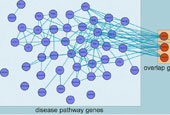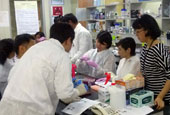-
 Korea.net's 24-hour YouTube channel
Korea.net's 24-hour YouTube channel- NEWS FOCUS
- ABOUT KOREA
- EVENTS
- RESOURCES
- GOVERNMENT
- ABOUT US
Ewha Womans University researchers have discovered a protein that can disassemble cholesterol in the liver and thus suppresses hyperlipidemia, a well-known risk factor for arteriosclerosis, or the hardening of the arteries. It is expected to be used as a target protein for the development of treatments for hyperlipidemia and arteriosclerosis, both major causes of disease and death across the world.
Statin-related medications are currently used to treat hyperlipidemia, abnormally elevated levels of fat in the blood, and recently researchers have focused on using adipokines, signaling proteins secreted by adipose tissues, as the target protein. The Ewha researchers found that the resistin-like molecule alpha (Retnla), a type of adipokines, represses hyperlipidemia and thus prevents arteriosclerosis from developing. When the concentration of fat rises in the blood, adipose tissues start the secretion of Retnla, which activates enzymes that break down cholesterol into bile acid. This again lowers the level of cholesterol in the blood and thus prevents arteriosclerosis.

In an experiment with mice, the scientists found that Retnla overexpression in mice suppressed the occurrence of hyperlipidemia and arteriosclerosis. The researchers discovered the role of Retnla in repressing hyperlipidemia and this is likely to lead to the development in the future of medicines that use the protein as a target.
The research was conducted with support from the Ministry of Science, ICT and Future Planning. The results were published online in Nature Communications on July 15.
The researchers intend to optimize Retnla so that it can be used in treatment programs and they plan to continue their research into the protein and to carry out clinical trials.
By Limb Jae-un
Korea.net Staff Writer
jun2@korea.kr
Statin-related medications are currently used to treat hyperlipidemia, abnormally elevated levels of fat in the blood, and recently researchers have focused on using adipokines, signaling proteins secreted by adipose tissues, as the target protein. The Ewha researchers found that the resistin-like molecule alpha (Retnla), a type of adipokines, represses hyperlipidemia and thus prevents arteriosclerosis from developing. When the concentration of fat rises in the blood, adipose tissues start the secretion of Retnla, which activates enzymes that break down cholesterol into bile acid. This again lowers the level of cholesterol in the blood and thus prevents arteriosclerosis.

On July 15, research results showing that Retnla has a cholesterol-lowering effect were published online in Nature Communications.
In an experiment with mice, the scientists found that Retnla overexpression in mice suppressed the occurrence of hyperlipidemia and arteriosclerosis. The researchers discovered the role of Retnla in repressing hyperlipidemia and this is likely to lead to the development in the future of medicines that use the protein as a target.
The research was conducted with support from the Ministry of Science, ICT and Future Planning. The results were published online in Nature Communications on July 15.
The researchers intend to optimize Retnla so that it can be used in treatment programs and they plan to continue their research into the protein and to carry out clinical trials.
By Limb Jae-un
Korea.net Staff Writer
jun2@korea.kr
Related Contents
Most popular
- First hearing-impaired K-pop act hopes for 'barrier-free world'
- 'Mad Max' director impressed by 'cinema-literate' Korean viewers
- Romanian presidential couple visits national cemetery
- 'Korean mythology is just as wonderful as Greek and Roman'
- Hit drama 'Beef' wins awards from 3 major Hollywood guilds


















